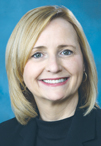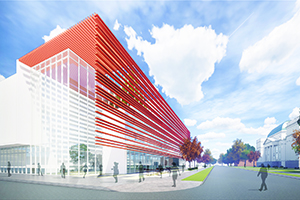By NANCY FRAZIER O'BRIEN
Catholic Health of Buffalo, N.Y., is getting in on the ground floor of a local college's planned Health Professions Hub.
The Hub — a 50,000-square-foot clinical training center on the campus of Buffalo's D'Youville College — will educate students for eight health professions and include a primary care clinic with professional staff and resources provided by Catholic Health. It is expected to open in the fall of 2020.

Markiewicz
D'Youville College announced plans to build the Hub in September 2016 but acknowledged in talks with Catholic Health that "as a university they did not have the experience to run a primary care clinic," said Joyce Markiewicz, president and chief executive of Catholic Health Home and Community-Based Care.
"But the idea of having a clinic on campus made sense," she said, noting that the school is "in one of the poorest ZIP codes in Buffalo" and home to a population that has been receiving health care primarily through emergency room visits.
In late 2018, Catholic Health obtained a $5.07 million grant from Community Partners of WNY (Western New York) for the Health Professions Hub. That represents the largest campus investment in the college's history and about a quarter of the project's $20 million budget.
Community Partners is a network of more than 100 health, human service and educational organizations; Catholic Health plus five community hospitals; and over 1,000 physicians. It is funded through the New York State Delivery System Reform Incentive Payment program with the dual goals of reducing avoidable hospital use and improving care to the Medicaid population.

A conceptual rendering by CannonDesign of the planned Health Professions Hub at D'Youville College in Buffalo, N.Y. The Hub will include a primary care clinic run by Catholic Health.
In addition to offering primary and preventive care as well as ob-gyn services, the Hub will include an on-site pharmacy and lab and imaging services, Markiewicz said.
And the benefits of the Hub project are expected to go far beyond the confines of the neighborhood surrounding D'Youville College.
"Most major cities have a real shortage of health care workers," said Lorrie Clemo, president of D'Youville College. "In our area alone, by 2024, we will need an additional 10,000 health professionals. We will produce at least 700 a year at D'Youville."
The college offers certificates, bachelor's and advanced degrees in eight health professions: dietician, physical therapist, nurse practitioner, pharmacist, physician assistant, nurse, chiropractor and occupational therapist.
In addition, students at five high schools within walking distance of the D'Youville College campus will have the opportunity to earn credits in the health sciences before graduation, thus decreasing the time and money they will need to obtain a bachelor's degree.

Clemo
One aspect of the Hub that Clemo considers distinctive will be the interprofessional, team-oriented learning atmosphere. "I have not seen this model used anywhere in the country," she said. "Students may be exposed to two or three of the (other) professions during their coursework (at other schools), but not all eight.
"It provides a bridge from the college setting right into the workforce," where cross-disciplinary teams are becoming the norm, Clemo added.
Herself a nursing graduate of D'Youville College, Markiewicz said her training was almost entirely classroom-based. "Even in recent years, at Catholic Health, we might have had students for a day or two, but now there is a real shift into community care," she said.
Markiewicz said Catholic Health also expects the Hub to provide opportunities for growth among the current workforce and to train potential employees for a variety of entry-level positions, including dietary aides and home health care aides.
"All of that makes perfect sense to us, and will help us fill positions throughout the system," she said.
The Hub will include a number of state-of-the-art simulation labs and gives Catholic Health a chance to help design its community clinic — which will be run on a long-term lease with the college — from the ground up.
"Usually we are retrofitting a building" that was used for another purpose, Markiewicz said, adding that the Hub might also become a center for providing telemedicine to the broader community.
She said work groups made up of representatives of the college and Catholic Health are exploring different configurations for the clinic, classrooms, simulation labs and common areas.
Founded in 1908 by the Grey Nuns and named for their foundress, St. Marguerite d'Youville, the college currently has more than 3,000 students studying for undergraduate, graduate or doctoral degrees in health care, business and the liberal arts.
Clemo said she expects the Hub project to "help us grow enrollment by 1,000 students in the next five years." But she is most excited at how it will help the college achieve its three-pronged institutional goals "focused on the strengths of the college, the needs of the community and our desire for our students to succeed.
"We see this as a model that other urban communities with health disparities and a low-income population could very easily adopt," she said, adding that both d'Youville and Catholic Health are "mission-driven institutions, with mission-driven workforces that we want to strengthen.
"We've been very intentional in finding partners that want to have the same sort of impact in improving our community," Clemo said. "It is a wonderful partnership because of that shared mission."